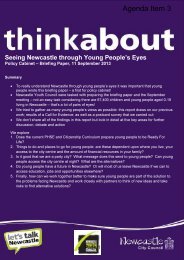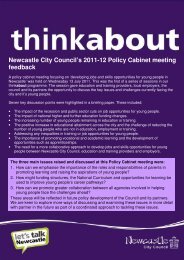NEWCASTLE'S MUSICAL HERITAGE AN INTRODUCTION By ...
NEWCASTLE'S MUSICAL HERITAGE AN INTRODUCTION By ...
NEWCASTLE'S MUSICAL HERITAGE AN INTRODUCTION By ...
You also want an ePaper? Increase the reach of your titles
YUMPU automatically turns print PDFs into web optimized ePapers that Google loves.
after its premier in Berlin and only five months after its premier in London, where<br />
that same year the opera had resulted in a Freischutz craze with four, possibly<br />
five, different versions being given. We cannot be sure which version reached the<br />
Theatre Royal, Mosley Street and might even have been the English version by<br />
‘Septimus Globus’, which was entitled, ‘Der Freischutz, a new muse-sick-all and<br />
see-nick performance from the new German uproar by the celebrated<br />
Funnybear.’<br />
In the late 18 th and early 19 th centuries the musical stage in Newcastle would<br />
have comprised mostly light-hearted plays shot through with musical numbers.<br />
Marital mix-ups, rustic romances and mythological subjects were favourite topics.<br />
The music performed in these productions may not have been original; there was<br />
a tendency to use popular musical numbers. William Shield was making an art of<br />
this in his successful productions at Covent Garden in London. There were<br />
various names for this sort of entertainment; burlesques, burlettas, comic operas<br />
etc.; in 1837 at the newly opened Theatre Royal on Grey Street, one<br />
presentation was advertised as a lightly popular mythological, operatical classical<br />
burlesque Burletta! Italian opera did not come to Newcastle theatres until the mid<br />
century but when it arrived it proved very popular as did the rather risqué French<br />
musical farces of the time. These performances of opera and lighter fare would<br />
have been of a high standard for the times as there was no stinting on the artists<br />
presented. Particularly in the performances of Italian Opera the world’s greatest<br />
singers were often to be heard. In the latter part of the 19 th century the great<br />
singers in opera were idolised as footballers and pop stars are today. Generally<br />
speaking standards improved when London touring companies began taking<br />
over from the old stock company system of presentations and by the late<br />
Victorian Era the musical side of Newcastle’s theatre life would have been the<br />
equal of anywhere in the country outside the capital.<br />
The Theatre Royal, Grey Street, opened on 20 th February 1837 (Mosley<br />
Street theatre closed 25 th June 1836) and the production mounted on 1 st March<br />
could be said to have set the pattern for what was to follow; two performances a<br />
night with a play followed by a musical item and then an afterpiece – a farce with<br />
music. On that opening night the play was ‘Pizarro’ or ‘The Spaniards’ with a host<br />
of characters playing Spaniards and Peruvians and a bevy of young ladies as<br />
Virgins of the Sun. A Grand Overture followed and then the musical farce<br />
‘Rosina’. This was the story, based upon Charles Simon Favart’s ‘Les<br />
moissoneurs’ (1768). on which William Shield had based his opera ‘Rosina’ and<br />
probably this was a production of the same but no mention is made of Shield on<br />
the handbill. <strong>By</strong> the 1840s there were oratorio performances taking place in the<br />
theatre and a series of promenade concerts, as previously mentioned, was<br />
mounted without success. It is interesting to note, however, that these concerts<br />
preceded the visit of Mon. Jullien and his unrivalled band, and Dr William Rea by<br />
many years. In spite of the disinterest Newcastle always appears to have shown<br />
in matters cultural, its musical history shows that in some respects it was the<br />
equal of many larger provincial towns in the country. In 1848 Newcastle heard<br />
54

















